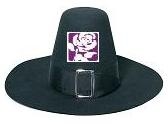Last Orders?

First we came for the witches...
In the Village, the pubs and bars, with very few exceptions, were like those of a ghost town compared to years past in the couple of weeks leading up to Christmas. Usually anything bar Monday evening would see the level of custom somewhere between heavy and heaving.
It should be said that according to a contact in the pub trade that the Village is somewhat notable for strange seasonal swings in business out of line with generally accepted patterns, but the same could never be said of my old home town in the heart of the Yorkshire beer belt?
Yet here again the pattern was similar, with the rather nice pub that was my local from before legal drinking age until I started my long drift south was closed down, apparently having run into financial difficulties despite a fine location and, the last time I was there, a solid customer base. According to more expert opinion on West Yorkshire hostelries, in the form of my father, this was not an isolated problem, with his typically pessimistic prognosis being that the pub "was on its way out".
It would, of course, be easy to lay the blame directly at the door of the most significant act of national government apropos the premises in question, in the form of the smoking ban, but this, I'm sure is simplistic and, while doubtless significant, not the whole story. There are changes in lifestyle that may play a part and many may applaud, and there is the fact that visiting the pub is becoming an increasingly expensive pastime.
If there is any truth in the imminence of the £4 pint, reported widely before Christmas, due to the rise in world grain prices, the future does not exactly look rosy, especially for those without the strength that the numbers of the large chains can bring.
With the risk of sounding like Jim Hacker having watched my dad's entire boxed set of 'Yes Minister' over the last few days, the Pub is a real British institution; except, of course, to those in the government who believe that great British Institutions are things like ID cards. It does seem to be an institution though that is under some threat at the moment and as an Industry that has shown itself very capable of moving successfully with times and fashions it is hard to conclude anything other than that much of the current threat must come from some of the extraordinary external factors, most of which in some form stems from Government actions.
In this context, even a raise in excise duty in line with the RPI next time around can only be interpreted as an overtly hostile act. True, it's a racing certainty that there will be some sort of concession for the likes of the Scotch Whisky industry, considering the Prime Minister and Chancellor's personal political needs, but if anything I would have thought that the impact of a rise in the cost of raw materials would be less for such a product than in the case of a simple pint of beer.
HMCE revenue from wine, beer, cider and spirit duties is forecast to cross the £8 billion mark in 2007-08, just under 5% of HMCE revenues, even before you take into account VAT receipts. It's a healthy enough take already and it's about time the government realises that they have their knife at the throat of the golden goose.
The problem is that it is easy to present it as a 'moral' tax on health grounds, but it should be noted that the reported fall in pub trade has not been accompanied with any similar statistics on falls in the problems associated with the down side of alcohol consumption. Freed from the constraints of providing a high staffing ratio, a convivial premises or, for that matter, a quality product you can still buy loopy strength lager from the supermarket for about 70p a can, so why should there be any such change?
Incidentally if I buy a pint at Base Camp, I am guess I am paying around 46p in VAT to the Treasury, buy the cheap supermarket alternative and the figure drops to around 13p, so perhaps the puritanical element that still holds such sway over our hopeless government should not take unalloyed pleasure over the sight of the damage they have caused.
It's time to give the licensed trade a break. Even if it's beyond the wit of ministers to understand the concept that less tax doesn't always mean less revenue, surely they can find some way to make the burden fall more heavily on the sales of cheap and nasty booze that can more easily find its way into the hands of those under age to consume it, without further damaging a sector that, while not without its faults, is still fundamentally an asset to the country. This is also, to any intelligent person, not the time for the government to once again satiate it's nanny fetish with further smoking restrictions, such as exclusion zones near the pub door; were only there any signs that the current government was composed of intelligent people.
Perhaps also they may choose to reflect on the nature of those areas which will resent the loss of local pubs, and those parts of society where the pub plays has the highest significance in local social life.
Some day the time will come when those in Labour's heartland will realise that Labour only represents them to the same extent that other parties such as the Lib Dems at one extreme and, sadly, the scum of the BNP do at the other, and in terms true empathy with their day-to-day lives, the metropolitan elite that is the bedrock of the NuLab project comes a poor third.
Labour's agenda of clumsy paternalist puritanism can only hasten this time.









